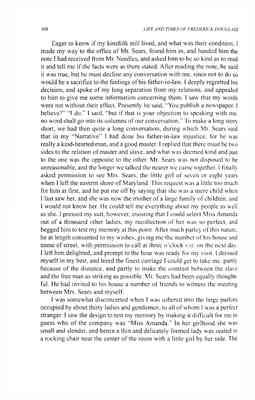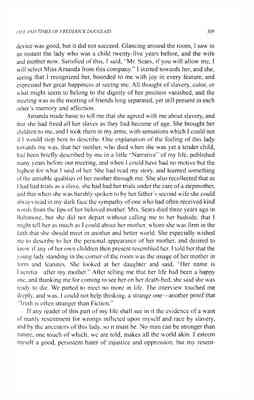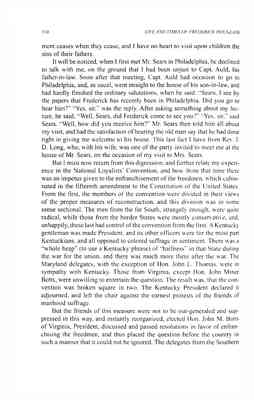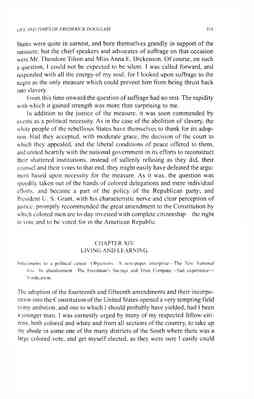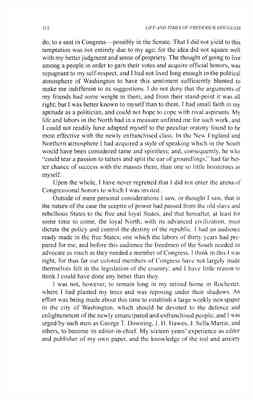Pages
156
308 LIFE AND TIMES OF FREDERICK DOUGLASS
Eager to know if my kinsfolk still lived, and what was their condition, I made my way to the office of Mr. Sears, found him in, and handed him the note I had received from Mr. Needles, and asked him to be so kind as to read it and tell me if the facts were as there stated. After reading the note, he said it was true, but he must decline any conversation with me, since not to do so would be a sacrifice to the feelings of his father-in-law. I deeply regretted his decision, and spoke of my long separation from my relations, and appealed to him to give me some information concerning them. I saw that my words were not without their effect. Presently he said, "You publish a newspaper, I believe?" "I do," I said, "but if that is your objection to speaking with me, no word shall go into its columns of our conversation." To make a long story short, we had then quite a long conversation, during which Mr. Sears said that in my "Narrative" I had done his father-in-law injustice, for he was really a kind-hearted man, and a good master. I replied that there must be two sides to the relation of master and slave, and what was deemed kind and just to the one was the opposite to the other. Mr. Sears was not disposed to be unreasonable, and the longer we talked the nearer we came together. I finally asked permission to see Mrs. Sears, the little girl of seven or eight years when I left the eastern shore of Maryland. This request was a little too much for him at first, and he put me off by saying that she was a mere child when I last saw her, and she was now the mother of a large family of children, and I would not know her. He could tell me everything about my people as well as she. I pressed my suit, however, insisting that I could select Miss Amanda out of a thousand other ladies, my recollection of her was so perfect, and begged him to test my memory at this point. After much parley of this nature, he at length consented to my wishes, giving me the number of his house and name of street, with permission to call at three o'clock P.M. on the next day. I left him delighted, and prompt to the hour was ready for my visit. I dressed myself in my best, and hired the finest carriage I could get to take me, partly because of the distance, and partly to make the contrast between the slave and the free man as striking as possible. Mr. Sears had been equally thoughtful. He had invited to his house a number of friends to witness the meeting between Mrs. Sears and myself.
I was somewhat disconcerted when I was ushered into the large parlors occupied by about thirty ladies and gentlemen, to all of whom I was a perfect stranger. I saw the design to test my memory by making it difficult for me to guess who of the company was "Miss Amanda." In her girlhood she was small and slender, and hence a thin and delicately formed lady was seated in a rocking chair near the center of the room with a little girl by her side. The
157
LIFE AND TIMES OF FREDERICK DOUGLASS 309
device was good, but it did not succeed. Glancing around the room, I saw in an instant the lady who was a child twenty-five years before, and the wife and mother now. Satisfied of this, I said, "Mr. Sears, if you will allow me, I will select Miss Amanda from this company." I started towards her, and she, seeing that I recognized her, bounded to me with joy in every feature, and expressed her great happiness at seeing me. All thought of slavery, color, or what might seem to belong to the dignity of her position vanished, and the meeting was as the meeting of friends long separated, yet still present in each other's memory and affection.
Amanda made haste to tell me that she agreed with me about slavery, and that she had freed all her slaves as they had become of age. She brought her children to me, and I took them in my arms, with sensations which I could not if I would stop here to describe. One explanation of the feeling of this lady towards me was, that her mother, who died when she was yet a tender child, had been briefly described by me in a little "Narrative" of my life, published many years before our meeting, and when I could have had no motive but the highest for what I said of her. She had read my story, and learned something of the amiable qualities of her mother through me. She also recollected that as I had had trials as a slave, she had had her trials under the care of a stepmother, and that when she was harshly spoken to by her father's second wife she could always read in my dark face the sympathy of one who had often received kind words from the lips of her beloved mother. Mrs. Sears died three years ago in Baltimore, but she did not depart without calling me to her bedside, that I might tell her as much as I could about her mother, whom she was firm in the faith that she should meet in another and better world. She especially wished me to describe to her the personal appearance of her mother, and desired to know if any of her own children then present resembled her. I told her that the young lady standing in the corner of the room was the image of her mother in form and features. She looked at her daughter and said. "Her name is Lucretia after my mother." After telling me that her life had been a happy one, and thanking me for coming to see her on her death-bed, she said she was ready to die. We parted to meet no more in life. The interview touched me deeply, and was, I could not help thinking, a strange one - another proof that "Truth is often stranger than Fiction."
If any reader of this part or my life shall see in it the evidence of a want of manly resentment for wrongs inflicted upon myself and race by slavery, and by the ancestors of this lady, so it must be. No man can be stronger than nature, one touch of which, we are told, makes all the world akin. I esteem myself a good, persistent hater of injustice and oppression, but my resent-
158
310 LIFE AND TIMES OF FREDERICK DOUGLASS
ment ceases when they cease, and I have no heart to visit upon children the sins of their fathers.
It will be noticed, when I first met Mr. Sears in Philadelphia, he declined to talk with me, on the ground that I had been unjust to Capt. Auld, his father-in-law. Soon after that meeting, Capt. Auld had occasion to go to Philadelphia, and, as usual, went straight to the house of his son-in-law, and had hardly finished the ordinary salutations, when he said: "Sears, I see by the papers that Frederick has recently been in Philadelphia. Did you go to hear him?" "Yes, sir," was the reply. After asking something about my lecture, he said, "Well, Sears, did Frederick come to see you?" "Yes. sir." said Sears. "Well, how did you receive him?" Mr. Sears then told him all about my visit, and had the satisfaction of hearing the old man say that he had done right in giving me welcome to his house. This last fact I have from Rev. J. D. Long, who, with his wife, was one of the party invited to meet me at the house of Mr. Sears, on the occasion of my visit to Mrs. Sears.
But I must now return from this digression, and further relate my experience in the National Loyalists' Convention, and how from that time there was an impetus given to the enfranchisement of the freedmen, which culminated in the fifteenth amendment to the Constitution of the United States. From the first, the members of the convention were divided in their views of the proper measures of reconstruction, and this division was in some sense sectional. The men from the far South, strangely enough, were quite radical, while those from the border States were mostly conservative, and, unhappily, these last had control of the convention from the first. A Kentucky gentleman was made President, and its other officers were for the most part Kentuckians, and all opposed to colored suffrage in sentiment. There was a "whole heap" (to use a Kentucky phrase) of "halfness" in that State during the war for the union, and there was much more there after the war. The Maryland delegates, with the exception of Hon. John L. Thomas, were in sympathy with Kentucky. Those from Virginia, except Hon. John Miner Botts, were unwilling to entertain the question. The result was, that the convention was broken square in two. The Kentucky President declared it adjourned, and left the chair against the earnest protests or the friends of manhood suffrage.
But the friends of this measure were not to be out-generaled and suppressed in this way, and instantly reorganized, elected Hon . John M. Botts of Virginia, President, discussed and passed resolutions in favor of enfranchising the freedmen, and thus placed the question before the country in such a manner that it could not be ignored. The delegates from the Southern
159
LIFE AND TIMES OF FREDERICK DOUGLASS 311
States were quite in earnest, and bore themselves grandly in support of the measure; but the chief speakers and advocates of suffrage on that occasion were Mr. Theodore Tilton and Miss Anna E. Dickenson. Of course, on such a question, I could not be expected to be silent. I was called forward, and responded with all the energy of my soul, for I looked upon suffrage to the negro as the only measure which could prevent him from being thrust back into slavery.
From this time onward the question of suffrage had no rest. The rapidity with which it gained strength was more than surprising to me.
In addition to the justice of the measure, it was soon commended by events as a political necessity. As in the case of the abolition of slavery, the white people of the rebellious States have themselves to thank for its adoption. Had they accepted, with moderate grace, the decision of the court to which they appealed, and the liberal conditions of peace offered to them, and united heartily with the national government in its efforts to reconstruct their shattered institutions, instead of sullenly refusing as they did, their counsel and their votes to that end, they might easily have defeated the argument based upon necessity for the measure. As it was, the question was speedily taken out of the hands of colored delegations and mere individual efforts, and became a part of the policy of the Republican party; and President U. S. Grant, with his characteristic nerve and clear perception of justice, promptly recommended the great amendment to the Constitution by which colored men are to-day invested with complete citizenship—the right to vote and to be voted for in the American Republic.
CHAPTER XIV. LIVING AND LEARNING.
Inducements to a political career — Objections — A newspaper enterprise — The New National Era — Its abandonment — The Freedman's Savings and Trust Company — Sad experience — Vindication
The adoption of the fourteenth and fifteenth amendments and their incorporation into the Constitution of the United States opened a very tempting field to my ambition, and one to which I should probably have yielded, had I been a younger man. I was earnestly urged by many of my respected fellow-citizens, both colored and white and from all sections of the country, to take up my abode in some one of the many districts of the South where there was a large colored vote, and get myself elected, as they were sure I easily could
160
312 LIFE AND TIMES OF FREDERICK DOUGLASS
do, to a seat in Congress—possibly in the Senate. That I did not yield to this temptation was not entirely due to my age; for the idea did not square well with my better judgment and sense of propriety. The thought of going to live among a people in order to gain their votes and acquire official honors, was repugnant to my self-respect, and I had not lived long enough in the political atmosphere of Washington to have this sentiment sufficiently blunted to make me indifferent to its suggestions. I do not deny that the arguments of my friends had some weight in them, and from their stand-point it was all right; but I was better known to myself than to them. I had small faith in my aptitude as a politician, and could not hope to cope with rival aspirants. My life and labors in the North had in a measure unfitted me for such work, and I could not readily have adapted myself to the peculiar oratory found to be most effective with the newly enfranchised class. In the New England and Northern atmosphere I had acquired a style of speaking which in the South would have been considered tame and spiritless; and, consequently, he who "could tear a passion to tatters and split the ear of groundlings," had far better chance of success with the masses there, than one so little boisterous as myself.
Upon the whole, I have never regretted that I did not enter the arena of Congressional honors to which I was invited.
Outside of mere personal considerations I saw, or thought I saw, that in the nature of the case the sceptre of power had passed from the old slave and rebellious States to the free and loyal States, and that hereafter, at least for some time to come, the loyal North, with its advanced civilization, must dictate the policy and control the destiny of the republic. I had an audience ready made in the free States; one which the labors of thirty years had prepared for me, and before this audience the freedmen of the South needed an advocate as much as they needed a member of Congress. I think in this I was right; for thus far our colored members of Congress have not largely made themselves felt in the legislation of the country; and I have little reason to think I could have done any better than they.
I was not, however, to remain long in my retired home in Rochester. where I had planted my trees and was reposing under their shadows. An effort was being made about this time to establish a large weekly newspaper in the city of Washington, which should be devoted to the defence and enlightenment of the newly emancipated and enfranchised people; and I was urged by such men as George T. Downing, J. H. Hawes, J. Sella Martin, and others, to become its editor-in-chief. My sixteen years' experience as editor and publisher of my own paper, and the knowledge of the toil and anxiety
